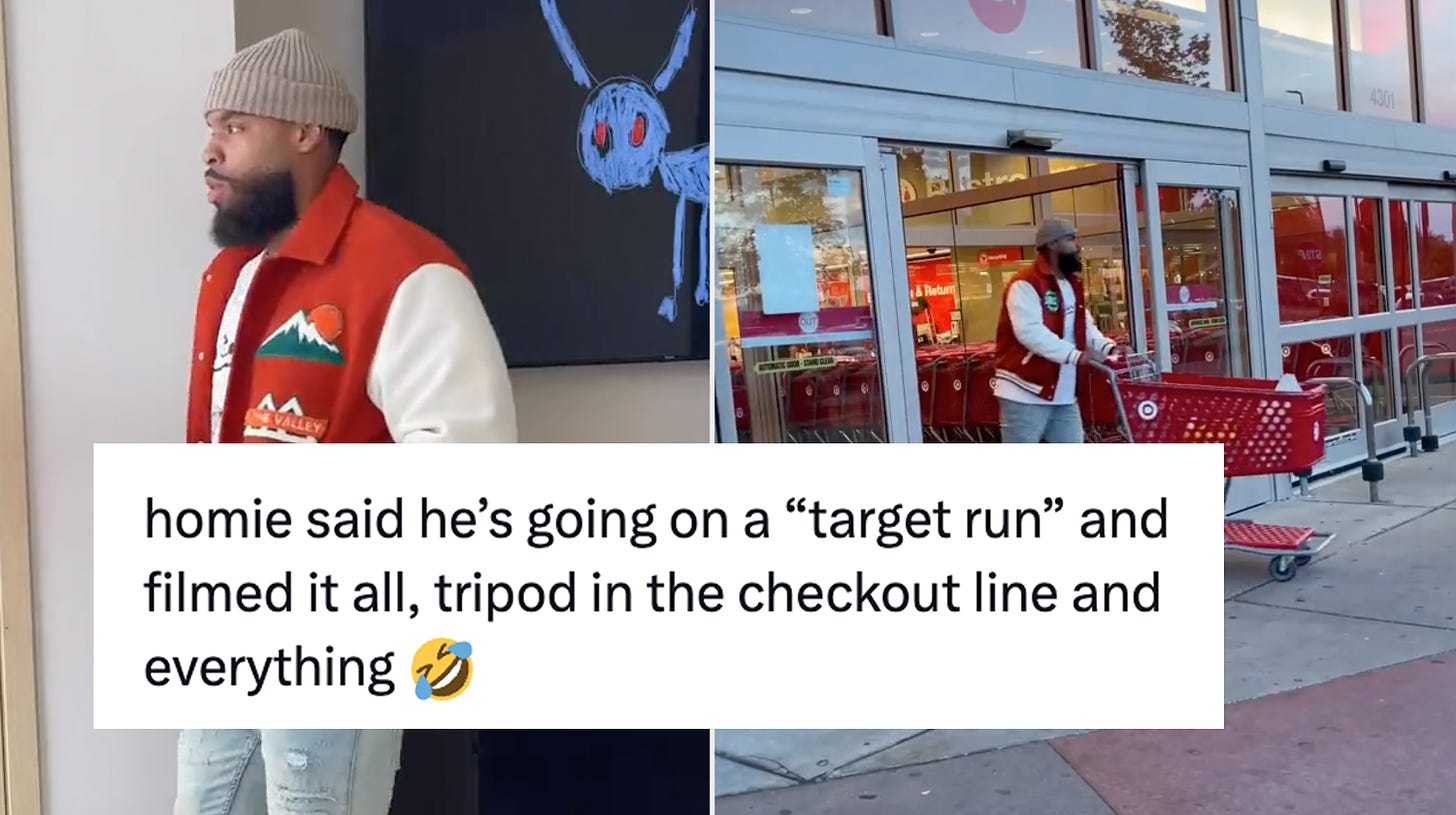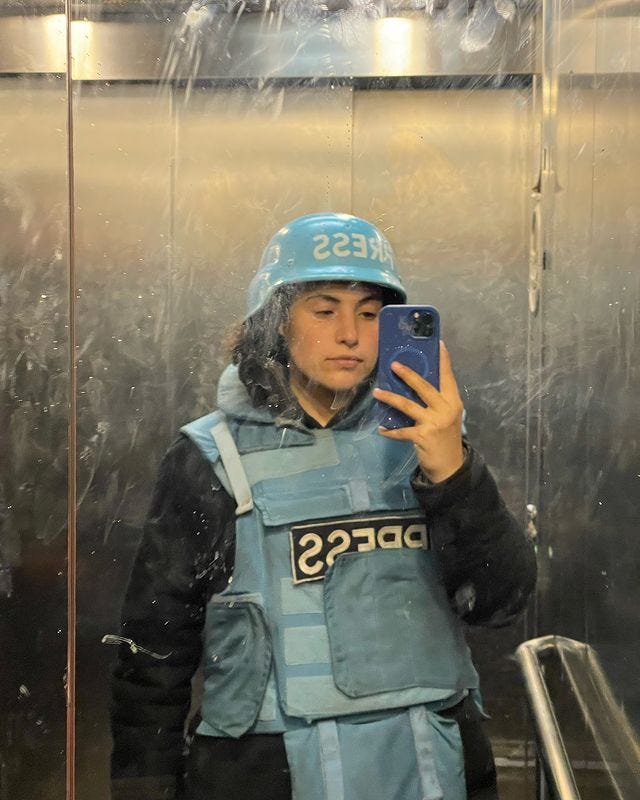
It’s funny how the Drew Walls thing blew up. People started referring to him as the “tripod guy,” an objectively hilarious title for someone who creates social media content—specifically “lifestyle” content. And even more specifically, the kind of videos Walls makes where he captures the mundane parts of his life with excessive effort.
Walls is known for his Target runs. In these videos, he shows himself parking his car, grabbing a cart, walking into the store, and pulling things off the shelf—all the way to checking out and getting settled in at home. People quickly caught he was using a tripod to capture this content, which meant, after each activity, he had to pick up the tripod and reposition it in a new location.
This experience isn’t exclusive to video creators like Walls. As the title of Rebecca Jennings’ Vox story states, “Everyone’s a sellout now,” which is to say we’ve all made fools of ourselves trying to produce something for others’ consumption. In many ways, this is a requirement of being alive and having a chance at comfort in today’s celebrity-centered, capitalistic culture.
“The internet has made it so that no matter who you are or what you do—from nine-to-five middle managers to astronauts to house cleaners—you cannot escape the tyranny of the personal brand,” wrote Jennings.
Presenting our lives is an industry in and of itself, commercialized by brands that benefit from the rate at which people consume our thoughts and daily routines. This has catapulted video bloggers into celebrities, fashion icons, and movie stars. Look at Walls. He documented himself into a paid partnership with Target during Super Bowl LVIII and a Drake parody video shared on the rapper’s Instagram.
We’re all susceptible to becoming celebrities whether we want to or not. Many of us use social media to improve our lives or the lives of others. For Walls, social media success was his goal. It’s something he wants to continue to grow. “I want to be the biggest lifestyle creator to do it on Instagram,” Walls told Complex in January 2024. “I’m talking like I want Super Bowl commercials. I want to take it to that level… I want to make sure my daughter got everything that I’ve never had.”
On the other hand, social media is also viewed as a tool for political advocacy—less for personal growth and more as a necessity for bringing awareness to a particular cause. But even then, activists can become celebrities, especially as social media companies and their algorithms censor political speech and force people to find their own sources of truth. People develop parasocial relationships with these figures, making them into stars they never intended on becoming.
I think about Bisan Owda, the 25-year-old Palestinian content creator. In August 2023, she spoke with UN Women about content creation's role in advancing gender equality in Palestine. “Used responsibly, content creation gives one the opportunity to express their points of view on various societal issues and contribute to building community awareness around critical societal issues such as gender equality and women's rights,” said Owda.
This was two months before Owda’s world turned upside-down. She went from creating travel and culture vlogs to wearing a blue vest and helmet made for identifying journalists in war zones. People around the world, many of them English-speaking, began looking to Owda for updates on the genocide in Gaza.
Before last October, Owda primarily posted for herself and her Palestinian audience. She published captions in Arabic, videos of her speaking in Arabic, and her vlogs pictured her at university, enjoying concerts, and traveling the world. Palestine was still under Israeli occupation, but she could expect life. Now, with more than four million followers on Instagram, Owda’s videos start with her declaring, much to people’s relief, that she’s still alive.
Owda’s Instagram comments include people transcribing her words, sending love, and expressing regret for not doing enough to stop the genocide. Someone said the first thing they do when they wake up is check Owda’s account. Another person told Owda she was their family. People have even tweeted the phrase “on Bisan’s internet,” as some in stan communities do for their favorite celebrities.
Despite the thousands of people engaged with Owda’s posts and millions following her on social media, the genocide has spanned more than 150 days. Israeli attacks have killed over 30,000 Palestinians in Gaza. Palestinians reporting from the rubble have wondered if their content documenting the destruction, starvation, and lack of medical care helps achieve justice or if it has just become more content to scroll past and passively consume.
“You are all useless,” tweeted another Palestinian journalist, Motaz Azaiza, who currently has one million followers on X (formerly known as Twitter) and more than 18 million on Instagram. “Without shame watching us get killed one by one.”
Azaiza’s words highlighted how the world’s evils and the scarcity they produce have turned us all into the watchers and the watched. We accept defeat, believing we're incapable of transforming society because everything we see from our media, political figures, and even our parents indicates our current reality is permanent. We're taught our only option for survival and success is to attain status within society’s confines.
In the case that we disrupt this reality, liberal media platforms find one of us they can call a hero, cherry-picking our contributions instead of helping people see the collective work we’re a part of.
GQ Middle East named Azaiza its 2023 ‘Man Of The Year.’ TIME profiled Amazon Labor Union president Chris Smalls as possibly representing “the future of labor." New York Magazine photographed him on the cover of one of its issues and called him “The Organizer.”
For Azaiza and Smalls, state-sanctioned violence necessitated their action. Then, the state’s media apparatuses positioned them as symbols of important work that had been done instead of active participants in resisting oppression. In covering the genocide, Owda and Azaiza have been made into influencers. They’ve amassed giant social media followings. People repost their content from a distance before scrolling to Walls’ latest tripod video.
The timeline is where everything converges, packaged neatly under keywords, hashtags, and trending topics. It flattens us. It strips our work and experiences of effectiveness. We’re made useless—incentivized to scroll instead of taking action. And the content we create to reach the volume of people we’re only capable of connecting with on social media becomes one more thing for people to consume.
I recognize these factors as someone who has gained audiences posting online and is actively doing so. Even in writing this essay, I worry I’m screaming into the void. Still, I trust we’re only as useless as we believe ourselves to be. We’re only as useless as our actions and willingness to join with others dictates.
Toni Cade Bambara, the multi-hyphenated artist, felt she had a purpose. In an interview with Kay Bonetti, Bambara said, “As a cultural worker who belongs to an oppressed people, my job is to make revolution irresistible.”
What is the work we can't scroll past because the revolution it calls forth is so captivating?
In 1971, Gil Scott-Heron declared, “The revolution will not be televised.” And with that being said, I don’t know if it will be posted on social media either. I don’t know if the revolution can be captured on the timeline or in a newsletter. I don’t think we’ll have time to set up our tripods, capture the shot, and place them somewhere new. We’ll likely find the things algorithms have told us to care about aren’t all that important.
We’re all trying to survive, to continue declaring our existence. May we remember the work of liberation—the work of revolution—gives us our best chance at being useful. Not just watching. Not just waiting for death. But fully experiencing our survival and providing our people everything they need.









Fantastic piece. I have a battle with what social media is for me constantly, to the point where I take two-week sabbaticals every month to give myself breath and to ensure what I create and who I am comes from experiencing the world without needing to capture it all in real time. There are things I want to share — that’s what I love most, curating thoughts and sharing them for others to discuss with me, but AFTER I’ve had time with the experience. I need time. We all do. The reactionary culture and the thirst for celebrity-ship gets us further away from the beauty of patience, privacy, and purpose. Bisan is seeking refuge and peace in her urgency, because that is literally all she has. While others are just addicted to its chains with no real tether to why they must wake up in the morning to endure the chaos and inconsistency of the timeline.
It’s such a mixed bag. I remember when platforms and outlets didn’t construct themselves for us to be hooked to them. We’re long gone from that.
Thank you for this piece. I’m a new reader (and now subscriber) ❤️
Thank you bro 🙏🏿